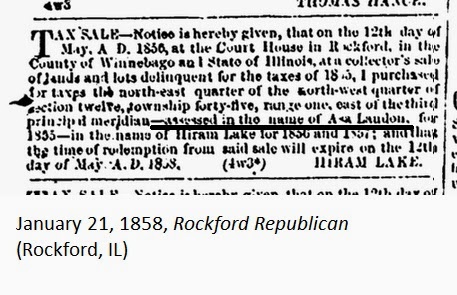
Tax sales of real property get recorded with other land deeds in the appropriate local office (usually the county recorder, but not always). However using the grantor and grantee indexes to land records will not locate these deeds.
That’s because the grantor on the tax deed usually is not the owner who failed to pay their taxes. It’s often the county sheriff or another county official. The person who did not pay taxes and had the property taken from him because of that is not the owner. That’s why they are not the grantor on the property–they don’t have the title to transfer.
The deed will be in the grantee index under the name of the purchaser of the property. That’s another name the researcher probably does not know. There is one place to search in the local records for the name of the property owner whose property was sold for non-payment of taxes: local court records. They may appear in a lawsuit as a defendant in the legal action that took place before the property was actually sold for non-payment.
Their name may also appear in newspaper notices as well.








5 Responses
You can also search by the legal description of the land. It would be on any previous deeds. In a city it will list a Lot #, Block# or name, and the name of the addition. On farm land it will be the Section #, Township # and Range #. If it is only a part of a section it will read something like this NW 1/4 of Sec4-Twnsp4-Range4
That’s true in counties that have these indexes (often called tract, parcel, or lot indexes). The problem is that not all counties have these indexes. There are some counties in federal land states (where land is described in townships, etc.) that don’t even have these indexes, although many do). FamilySearch does not microfilm these tract indexes usually either–and many people who only use their materials are not even aware that they exist. In state land states, where property is described in metes and bounds, these indexes aren’t even possible because of how land is described. But where they do exist they are extremely helpful for many reasons–including tax sales.
I just yesterday found a tax sale notice in a newspaper from May of 1790, in Maryland. It nicely laid out the names of the tracts my ancestor owned, as well as those of two of his sons’ tracts. Apparently the family hit hard times. I was thrilled to find this, as I know few details about this ancestor and will not be able to travel to research locally.
Any chance the local land records are online at FamilySearch?
Well, they weren’t there the last time I looked, but that was quite a while ago, so, I need to check. Thanks for reminding me. Just cause it wasn’t there once doesn’t mean that it’s still not there.